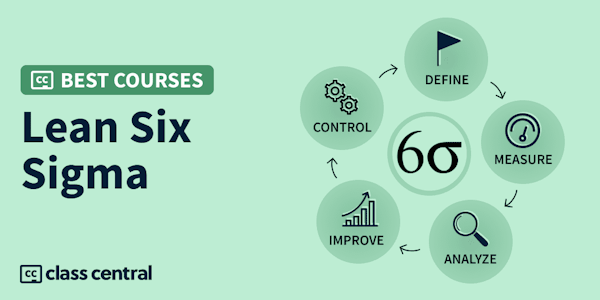COURSE OUTLINE: The course on Six-Sigma will focus on detailed strategic and operational issues of process improvement and variation reduction. Six-sigma is a measure of quality that strives for near perfection. It is a disciplined, data-driven approach for eliminating defects (driving towards six standard deviations between the mean and the nearest specification limit) in any process-from manufacturing to transactional and from product to service. A Six-sigma defect is anything outside of customer specifications. To be tagged Six Sigma, a process must not produce more than 3.4 defects per million opportunities. Six-sigma employs a systematic approach of DMAIC (Define, Measure, Analyze, Improve and Control) for the process improvement. This course will provide a detailed understanding on various issues specific to each phase of DMAIC.
Overview
Syllabus
Six Sigma-Introductory Video.
Lecture 1: Brief overview of the course.
Lecture 2: Quality concepts and definition.
Lecture 03: History of continuous improvement.
Lecture 4: Six Sigma Principles and Focus Areas (Part 1).
Lecture 5: Six Sigma Principles and Focus Areas (Part 2).
Lecture 6: Six Sigma Applications.
Lecture 07 : Quality Management: Basics and Key Concepts.
Lecture 8: Fundamentals of Total Quality Management.
Lecture 9: Cost of quality.
Lecture 10: Voice of customer.
Lecture 11: Quality Function Deployment (QFD).
Lecture 12: Management and Planning Tools (Part 1).
Lecture 13: Management and Planning Tools (Part 2).
Lecture 14: Six Sigma Project Identification, Selection and Definition.
Lecture 15: Project Charter and Monitoring.
Lecture 16: Process characteristics and analysis.
Lecture 17: Process Mapping: SIPOC.
Lecture 18: Data Collection and Summarization (Part 1).
Lecture 19: Data Collection and Summarization (Part 2).
Lecture 20: Measurement systems: Fundamentals.
Lecture 21: Measurement systems analysis: Gage R&R study.
Lecture 22: Fundamentals of statistics.
Lecture 23: Probability theory.
Lecture 24: Process capability analysis: Key Concepts.
Lecture 25: Process capability analysis: Measures and Indices.
Lecture 26: Process capability analysis: Minitab Application.
Lecture 27: Non-normal process capability analysis.
Lecture 28: Hypothesis testing: Fundamentals.
Lecture 29: Hypothesis Testing: Single Population Test.
Lecture 30: Hypothesis Testing: Two Population Test.
Lecture 31: Hypothesis Testing: Two Population: Minitab Application.
Lecture 32: Correlation and Regression Analysis.
Lecture 33: Regression Analysis: Model Validation.
Lecture 34: One-Way ANOVA.
Lecture 35: Two-Way ANOVA.
Lecture 36: Multi-vari Analysis.
Lecture 37: Failure Mode Effect Analysis (FMEA).
Lecture 38: Introduction to Design of Experiment.
Lecture 39: Randomized Block Design.
Lecture 40: Randomized Block Design: Minitab Application.
Lecture 41: Factorial Design.
Lecture 42: Factorial Design: Minitab Application.
Lecture 43: Fractional Factorial Design.
Lecture 44: Fractional Factorial Design: Minitab Application.
Lecture 45: Taguchi Method: Key Concepts.
Lecture 46: Taguchi Method: Illustrative Application.
Lecture 47: Seven QC Tools.
Lecture 48: Statistical Process Control: Key Concepts.
Lecture 49: Statistical Process Control: Control Charts for Variables.
Lecture 50: Operating Characteristic ,(OC).
Lecture 51: Statistical Process Control: Control Charts for Attributes.
Lecture 52: OC, Curve for Attribute control chart.
Lecture 53: Statistical Process Control: Minitab Application.
Lecture 54: Acceptance Sampling: Key Concepts.
Lecture 55: Design of Acceptance Sampling Plans for Attributes (Part 1).
Lecture 56: Design of Acceptance Sampling Plans for Attributes (Part 2).
Lecture 57: Design of Acceptance Sampling Plans for Variables.
Lecture 58: Acceptance Sampling: Minitab Application.
Lecture 59: Design for Six Sigma (DFSS): DMADV, DMADOV.
Lecture 60: Design for Six Sigma (DFSS): DFX.
Lecture 61: Team Management.
Lecture 62: Six Sigma: Case study.
Lecture 63: Six Sigma: Summary of key concepts.
Taught by
IIT Kharagpur July 2018
Tags
Reviews
4.5 rating, based on 6 Class Central reviews
-
Excellent................................................................................................................................................................................................................................................…
-
Very useful information as I'm pursuing my ph.d. I can learn research statistical analysis very quickly and in a very simple way
-
This course is very useful and to help develop the skills and in myself and grow my knowledge and understanding the six Sigma and help in my carrier growth and organisations goals achive
-
A very consice and complte course in the Lean six-sigma / quality field. As a professional , it helped me learn relevant things. I really recommend it to my collegues / persons passioned by quality profession
-
The course was very informative and interesting. It was very easy to interpret the topic and form own practical examples
-
very good course really enjoyed all apllications cleared really enjoyed thank you i will try friend to learn from this course this is so good...............................................................





